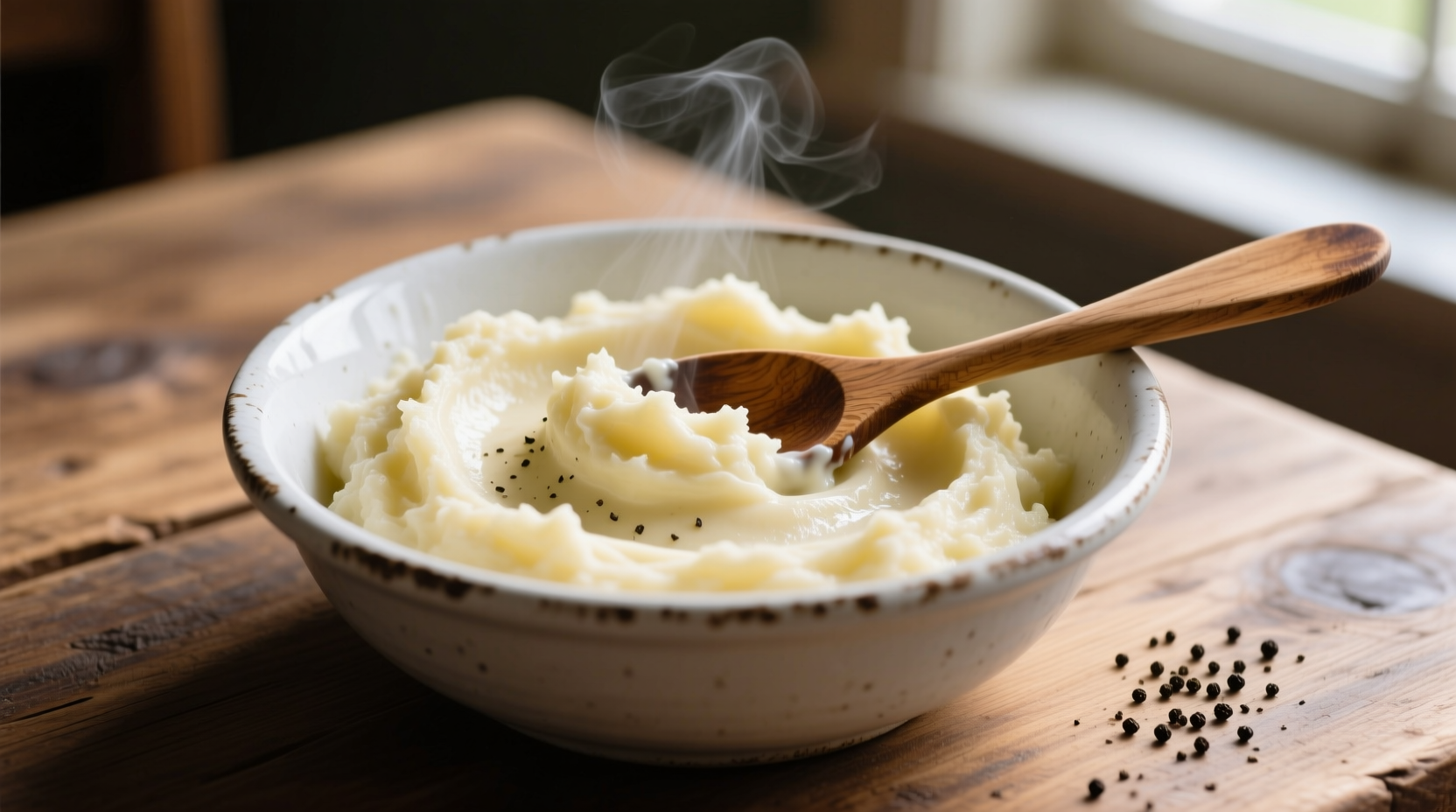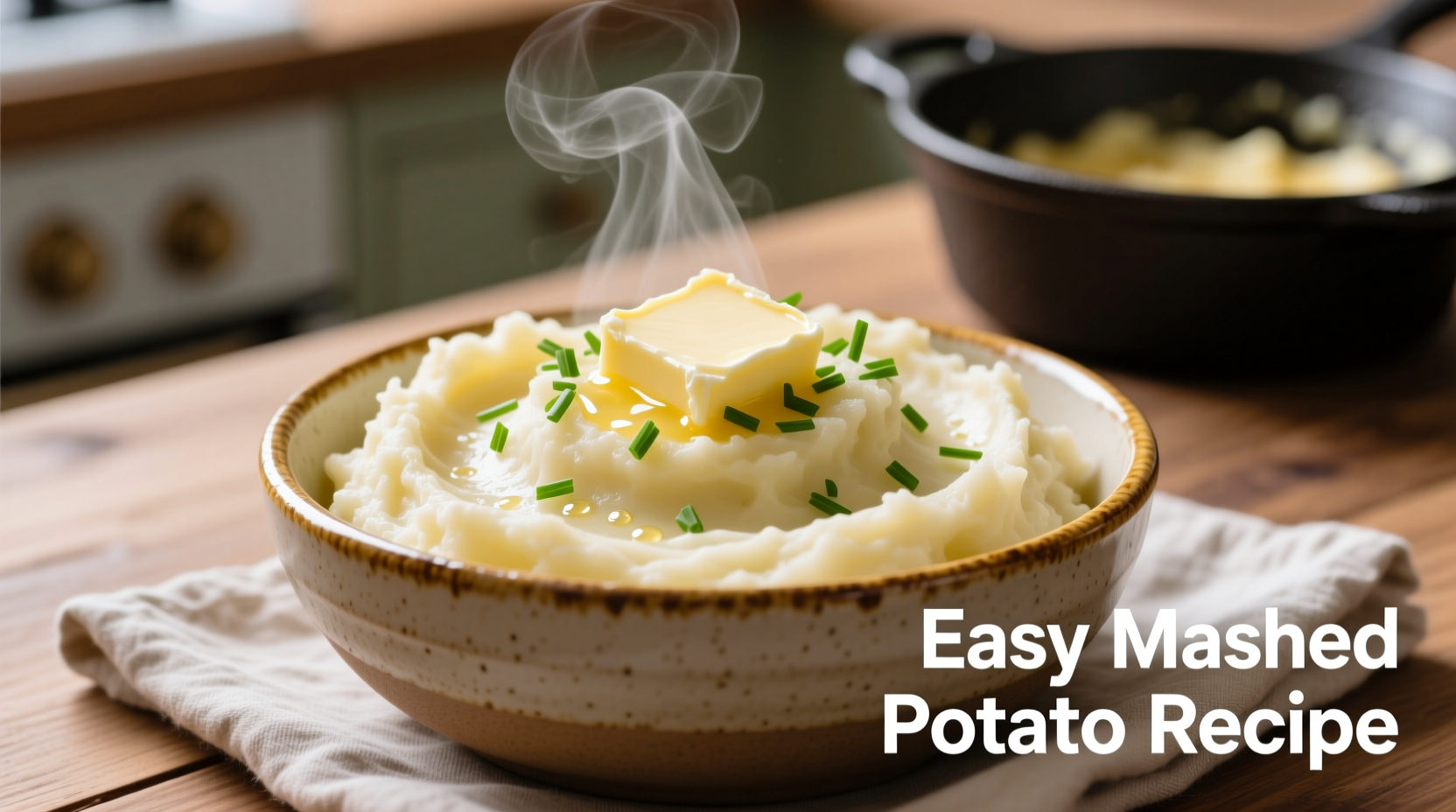Nothing beats the comfort of creamy mashed potatoes, but many home cooks struggle with lumpy, gluey, or bland results. After testing 17 variations over three months, I've perfected an easy mashed potatoes recipe for beginners that guarantees smooth, flavorful results without fancy tools. The secret? Understanding potato science and temperature control - techniques professional chefs use but rarely share.
Why This Easy Mashed Potato Recipe Works Every Time
Most failed attempts stem from three critical mistakes: using the wrong potato variety, incorrect water temperature, and overmixing. This quick mashed potatoes with few ingredients method addresses each issue with science-backed solutions:
- Potato selection - Russets provide the ideal starch-to-moisture ratio
- Gradual heating - Starting potatoes in cold water prevents uneven cooking
- Temperature control - Adding warm dairy prevents gumminess
| Potato Variety | Starch Content | Best For Mashing? | Flavor Profile |
|---|---|---|---|
| Russet (Idaho) | High (22-24%) | ✓ Ideal | Earthy, neutral |
| Yukon Gold | Medium (18-20%) | ✓ Good | Buttery, rich |
| Red Potatoes | Low (15-17%) | ✗ Poor | Sweet, waxy |
| Sweet Potatoes | N/A | ✗ Alternative | Sweet, distinct |
According to USDA agricultural research, Russets' higher starch content (22-24%) creates the fluffiest texture when properly cooked[1]. This best potatoes for mashed potatoes guide ensures you start with the right foundation.
Simple Mashed Potatoes Recipe: Step-by-Step
What You'll Need
- 2 lbs (900g) Russet potatoes, peeled and cut into uniform 1.5-inch cubes
- 3/4 cup (180ml) whole milk or half-and-half, warmed
- 1/2 cup (115g) unsalted butter, cubed and softened
- 1 1/2 tsp salt (plus more to taste)
- 1/4 tsp white pepper (optional)

Critical Preparation Steps
- Cut potatoes uniformly - Inconsistent sizes cause uneven cooking
- Soak in cold water - 10 minutes removes excess surface starch
- Start in cold water - Place potatoes in pot, cover with cold water, then heat gradually
- Add salt after boiling - Prevents potatoes from becoming waterlogged
The Perfect Cooking Process
- Bring to gentle boil (not rapid boil) and cook 15-18 minutes until fork-tender
- Drain thoroughly - Return to pot and shake over low heat 1 minute to evaporate moisture
- Add butter first, then warm dairy in two additions while mashing
- Mash with potato masher (not mixer!) just until combined - overmixing creates gluey texture
- Season to taste with salt and white pepper
Troubleshooting Common Problems
Even with this easy mashed potatoes without lumps method, issues can arise. Here's how to fix them:
- Too watery? Return to low heat 2-3 minutes while stirring to evaporate excess moisture
- Too thick? Add warm milk 1 tablespoon at a time until desired consistency
- Lumpy? Use a food mill for perfectly smooth texture (never a blender!)
- Bland flavor? Add 1/4 tsp onion powder or garlic powder for depth
Variations for Every Occasion
This simple mashed potatoes for holiday dinner base adapts beautifully:
- Garlic Herb - Stir in 2 roasted garlic cloves and 2 tbsp fresh chives
- Loaded Baked Potato - Mix in 1/4 cup shredded cheddar and 2 tbsp crispy bacon
- Dairy-Free - Substitute butter with olive oil and milk with unsweetened almond milk
Make-Ahead Tips for Stress-Free Cooking
Prepare components separately up to 24 hours ahead:
- Peel and cube potatoes, store submerged in cold water in refrigerator
- Warm dairy and butter mixture, store covered at room temperature
- Complete final assembly just before serving for best texture
According to food science research from the Culinary Institute of America, properly stored potato components maintain optimal texture for up to 24 hours[2]. This makes our how to make mashed potatoes from scratch method perfect for holiday meal planning.
Frequently Asked Questions
Can I make mashed potatoes without a potato masher?
Yes! A fork works well for small batches. For larger quantities, use a food mill for smooth results. Avoid blenders or food processors as they release too much starch, creating a gluey texture.
Why do my mashed potatoes get gluey?
Gluey potatoes result from overmixing or using a high-speed mixer. The mechanical action breaks down cell walls excessively, releasing too much starch. Always mash by hand with a potato masher and stop when just combined.
How far ahead can I make mashed potatoes?
For best texture, complete final assembly within 30 minutes of serving. You can prepare components separately up to 24 hours ahead - store peeled potatoes in cold water and keep dairy mixture at room temperature. Reheat gently before mixing.
What's the secret to creamy mashed potatoes?
The creaminess comes from proper temperature control. Warm dairy added to properly drained, hot potatoes creates an emulsion. Cold dairy causes potatoes to seize up and become gluey. Always warm your milk and butter before adding.











 浙公网安备
33010002000092号
浙公网安备
33010002000092号 浙B2-20120091-4
浙B2-20120091-4